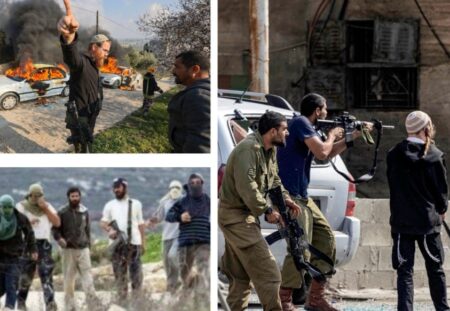Original Arabic Feature Story By Ala’ Moqadi – WAFA News
A farmer’s despair
On the damp soil, in the early hours of Tuesday morning, the tracks of the cart owned by farmer Raed Abdul-Hamid from the village of Yasuf appeared, dragged towards the illegal colony of “Tapuach West,” leading him to the harsh reality: even the simplest tools of a Palestinian farmer’s livelihood are not spared from the colonizers’ greed.
Escalating tensions
The village of Yasuf, located east of Salfit in the occupied West Bank’s central part, continues to face attacks by the paramilitary colonizers.
In recent days, they have begun constructing a new colonial road north of the village, extending towards the towns of Beita and Huwwara in the Nablus Governorate, in the northern West Bank.
This road will result in the illegal confiscation of dozens of dunams of olive tree-planted land.
A village under siege
With these policies, Yasuf has become a dangerous zone. Its 2,400 residents face unprecedented escalation in colonizers’ attacks, which have become the most severe in recent years.
Surrounded by four colonies (Tapuach, Nofei, Nehemiah, and Rehalim) from all directions, the village has turned into a large prison due to the continuous restrictions and harassment of the occupation soldiers and paramilitary colonizers.
Strategic importance
Wael Abu Madi, head of the village council in Yasuf, tells Wafa News Agency that the village’s geographic location holds strategic importance, connecting the Salfit Governorate with neighboring governorates.
However, the Israeli occupation’s closure of the main entrance to the village for several consecutive days, the establishment of sudden military roadblocks preventing citizens from entering or leaving freely, and colonizers’ attacks of stone-throwing at vehicles and assaults on drivers pose a threat to citizens’ lives and cause significant material damage.
Aim of isolation
Abu Madi adds, “The occupation aims at isolating the village from its surroundings and impose a new colonial reality that chokes the daily life of its citizens.”
Agricultural impact
The attacks have also affected the village’s agricultural lands, where settlers cut down dozens of ancient trees, set fire to olive trees, and steal crops and agricultural equipment in front of their owners’ eyes.
As a result, the harvest has decreased by more than half during the last olive-picking season, due to armed colonizers preventing farmers from reaching their lands.
Economic devastation
These repeated attacks have left devastating losses for the citizens and destructive impacts on the village’s economy, where most families depend on agriculture, especially olive products, as a source of income.
In the last olive-picking season, farmers were prevented from harvesting their olive trees over an area of approximately 2,500 dunams.
Personal losses
Farmer Rajeh Atiyani, one of dozens of farmers who have been attacked by colonizers, tells WAFA what happened to his land due to these attacks:
“I have nothing left. They uprooted the trees under the protection of the Israeli occupation forces, and we couldn’t stop them. Those trees were a legacy from my ancestors, and now nothing remains but ashes.”
Threats to homes
The attacks haven’t been limited to agricultural lands but also include citizens’ homes. The occupation army threatened over 75 homes with demolition orders and construction halt orders, including 7 homes facing immediate demolition, especially in the eastern area of the village, which contains the most beautiful and modern houses in the village.
Legal struggles
In this context, Abu Madi confirms, “We tried to file cases in Israeli courts through human rights organizations, but they were rejected. At any moment, the occupation will demolish these homes, as they invaded them weekly and took videos of the homes, in addition to increasing pressure on their owners.”
Expanding Colonies
“The Israeli occupation tries to impose a fait accompli and does not suffice with confiscating citizens’ lands but also tries to force farmers to abandon their lands to pave the way for colonial expansion through pastoral outposts,” Abu Madi adds.
Widespread violations
The Salfit Governorate documented about 657 violations by the occupation soldiers and the paramilitary colonizers in the towns and villages of the governorate during January. These violations target citizens and their lands as part of an escalation policy.
Abductions and road closures
The governor of Salfit Mustafa Taqatqa explains that the governorate witnessed a noticeable increase in abductions, detentions, invasions, and road closures, with 254 cases of abductions and detention, 113 invasions, and 130 violent house and facility searches recorded.
Obstructed movement
The governorate also saw 57 road and main entrance closures, and 42 temporary military roadblocks, obstructing citizens’ movements.
Destruction of olive trees
Regarding attacks on olive trees, Governor Taqatqa mentions that settlers cut down, broke, and uprooted 158 olive trees, including ancient ones, in Yasuf, Qarawat Bani Hassan, and Kafr al-Deek.
Additionally, 8 dunams of citizens’ lands were bulldozed in Haris, Sorta, and Kafr ad-Deek during three bulldozing operations by the occupation, along with five demolitions of houses and facilities in Kafr al-Dik, Kifl Haris, and Deir Ballout.
Property damage
The report also documented 22 attacks by paramilitary colonizers against citizens and their properties, 5 by the Israeli occupation forces, 5 property seizures on the pretext of working in areas classified as “C,” 16 property sabotage operations, and two cases of physical harm due to severe beatings by occupation soldiers.
Accountability
Governor Taqatqa affirms that “The occupation government and the international community bear responsibility for the dangerous deterioration witnessed by Salfit Governorate.”
He explained that these violations have exceeded all international norms, complicated the situation and hindered security and stability.
Taqatqa called on human rights and international organizations to shoulder their responsibilities and take action to protect citizens and strengthen their resilience on their lands.

